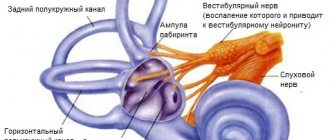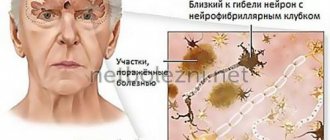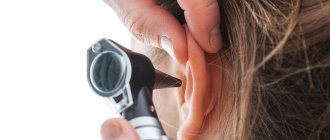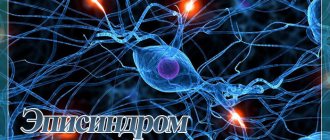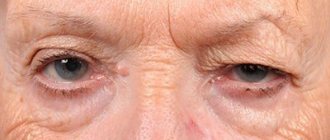General information about dementia
The popular name for dementia is senile insanity or senile dementia. Most often, this disease occurs against the background of aging of the body and accompanying changes. Dementia usually develops after the age of 65, but due to certain diseases, intoxications or injuries it can appear at an earlier age. Damage to the central nervous system is irreversible; properly selected treatment can only stop the process, but not reverse it.
A mild form of the disease occurs in about one in ten people over 65 years of age, and 5% of older people develop a severe form. It leads to a complete loss of the ability to self-care, as a result of which the patient requires constant care and observation. Women are affected twice as often as men.
Make an appointment
How to recognize the development of senile (senile) dementia
Although there are several types of dementia, their symptoms are similar. It is important to know the first symptoms of the disease in order to detect it in time and prevent further development. What you should pay attention to first of all:
- Memory impairment occurs. If suddenly a person cannot remember what recently happened to him, it is difficult for him to learn new information, there is a possibility that this is a manifestation of the initial stage of dementia.
- The patient has poor spatial orientation, cannot find his way home, and also loses track of time.
- A person who begins to develop dementia does not want to learn new information, since the brain refuses to perceive and process additional data.
- While planning upcoming events, your critical attitude towards yourself and what is happening around you decreases.
These are the very first signs of dementia. In the future, they will become more noticeable, and other more significant disturbances in the patient’s behavior may appear.
Dementia can have three degrees: mild, moderate and severe. They are differentiated depending on the symptoms and location of the affected area of the brain.
- Easy. The patient's memory and intellect are partially impaired, but the ability for self-criticism and self-care is not lost.
- Moderate. The patient requires supervision and care, since he cannot fully take care of himself, it becomes difficult for him to prepare food and eat it on his own. Memory and intelligence noticeably deteriorate, this can be immediately understood when communicating with the patient.
- Heavy. The person has absolutely no control over his actions. He does not understand what is happening to him, does not remember anything, cannot get dressed, wash or go to the toilet. People with severe dementia should not be left alone. It is important that they are always supervised.
We recommend
“Treatment of dementia in older people: drugs for different stages of the disease” Read more
Causes
The causes of dementia are diseases and conditions that cause degeneration and death of brain cells:
- Alzheimer's disease;
- Pick's disease;
- severe atherosclerotic damage to the vessels of the neck and brain;
- hemorrhagic and ischemic strokes, as well as transient ischemic attacks;
- arterial thrombosis;
- severe arterial hypertension;
- diabetes mellitus (high blood glucose causes angiopathy - damage to small vessels with subsequent oxygen starvation);
- acute and chronic intoxication (including alcohol);
- neuroinfections (encephalitis, meningitis);
- head injuries (concussions, brain contusions);
- malignant and benign brain tumors.
The presence of dementia in parents or other older relatives significantly increases the risk of developing the pathology. Predisposing factors also include excess body weight and insufficient intellectual functioning throughout life.
General concept
Dementia is a dementia acquired during life as a result of organic brain damage, trauma and infection. Unlike congenital dementia, which is characterized by insufficient development of the psyche, dementia is accompanied by its collapse. Around 50 million people worldwide suffer from this disease. It should be noted that dementia becomes a burden not only for the patient himself, but also for his family members.
Currently, more than 200 diseases are known that can provoke the development of dementia syndrome. The first place belongs to Alzheimer's disease, which affects 60% of patients. In second place are vascular pathologies as a result of hypertension and atherosclerosis. Other factors that provoke the disease include:
- GM neoplasms;
- traumatic brain injuries;
- Pick's, Parkinson's, Huntington's diseases;
- hormonal disorders - Cushing's disease, thyroid dysfunction;
- liver and kidney failure;
- autoimmune diseases, systemic vasculitis;
- multiple sclerosis;
- lack of B vitamins;
- infections - HIV, neurosyphilis, meningitis, encephalitis, Creutzfeldt-Jakob disease.
Dementia occurs as a result of damage to various brain structures: the cortex, subcortical structures, or multiple focal lesions in different parts of the brain tissue. In addition, there are combined forms that combine several types of disease.
As a rule, acquired dementia is a disease of old age. But in some cases it also affects young people. This is facilitated by alcohol and drug abuse, brain injury, tumors and infections.
Among famous people there are also those who have become hostage to this disease. The life of actor Robin Williams was cut short due to dementia, for which Lewy bodies are to blame. The disease was not diagnosed during the actor’s lifetime, but was discovered only after an autopsy.
Margaret Thatcher, Britain's greatest prime minister, suffered from dementia. According to her daughter, these were monstrous days for her mother, whose psyche underwent devastating changes that she steadfastly fought until the end of her life.
Types of pathology
There are several types of classification of senile dementia. The most common is based on the mechanism of development of the disease. The following types of pathology are distinguished:
- Alzheimer's (atrophic): based on a degenerative process in the cerebral cortex, most often found in Alzheimer's disease;
- cerebrovascular: occurs against the background of chronic insufficiency of blood supply;
- mixed.
The location of pathological foci is the basis of the second classification: cortical, subcortical, mixed and multifocal forms of dementia are distinguished.
Clinical manifestations allow us to distinguish two variants of the disease:
- lacunar dementia: mainly the intellectual sphere suffers, memory suffers, but the person is aware of himself and can assess his condition;
- total: loss of self-service skills and inadequate perception of reality.
Forms of mental retardation
Currently, there are several hundred forms of mental retardation. We will dwell in more detail on the description of some of these forms in the chapter on oligophrenia. Here we provide only the most general information about the groups into which individual forms of oligophrenia can be combined.
- Genetically determined forms of oligophrenia (chromosomal aberrations, gene defects).
- Mixed endogenous-organic forms of oligophrenia.
- Forms of oligophrenia caused by the influence of prenatal factors (blastopathy, embryopathy, fetopathy).
- Forms of oligophrenia associated with perinatal pathology (hemolytic disease of the newborn, asphyxia at birth, mechanical trauma during childbirth).
- Forms of oligophrenia caused by early postnatal exogenous organic lesions of the brain.
- Oligophrenia due to hydrocephalus.
- Socioculturally determined forms of oligophrenia.
Back to contents
Severity
There are three degrees of severity of pathology:
- mild: there is a decrease in short-term memory, emotional instability, inability to remember new things; the person can take care of himself independently and understands the need for treatment;
- moderate: self-care becomes difficult; a person begins to forget about basic actions (close the door, turn off the gas), and may get lost on the way to the store; already at this stage the patient requires constant monitoring;
- severe: complete loss of the ability to self-care and critical perception of reality, the need for constant care.
Symptoms
The main symptoms of dementia occur in all forms and types of the disease. They include:
- decreased short-term memory;
- difficulty in perceiving new information, learning new skills (for example, working with a computer or smartphone);
- viscosity of thinking: the patient takes a long time to think, he needs more time to solve any problems or issues;
- speech difficulties: slurred pronunciation, difficulty finding words;
- impaired coordination of movements, especially fine motor skills;
- uncertainty, unsteadiness of gait;
- inappropriate behavior: patients become overly sweet or, conversely, aggressive;
- disorientation in space and time.
Different types of dementia have their own characteristic symptoms. For example, the Alzheimer's type is manifested mainly by mental and memory disorders, changes in thinking, and inappropriate behavior. The vascular form of the disease is characterized by both intellectual and motor impairments, and dementia with Lewy bodies often takes on the character of a psychiatric pathology and is accompanied by hallucinations, delusions, insomnia and depression.
Organic dementia in children
Dementia develops in children for a number of reasons:
- neuroinfections;
- TBI;
- AIDS;
- neurointoxication with drugs and toxic substances.
The clinical picture of the disease depends on the age of the child and can occur in mild, moderate, and severe forms.
In preschoolers, dementia is primarily manifested by changes in the emotional sphere. Such children are especially excitable and emotionally labile. They do not form attachments, even to their mother. There is no fear of dangerous situations: they can easily leave with a stranger.
Cognitive functions suffer. Perception and attention are grossly impaired, making it difficult to acquire new knowledge and learn. Profound intellectual impairments appear. Games are unorganized: aimless throwing, jumping, running, jumping. There is no understanding of the role assigned to the child.
School-age children are unable to think abstractly. The meanings of proverbs, humor, and figurative meanings become incomprehensible to them. Thinking decreases, and the child cannot even apply previously acquired knowledge.
The emotional sphere is unstable. Emotional impoverishment appears, the range of interests is narrowed down to the satisfaction of basic needs.
Dementia acquired in childhood, especially in the early stages of development, threatens the child with a stop in development or the acquisition of pathological character traits.
Diagnostics
Neurologists and psychiatrists diagnose dementia. The examination includes:
- collecting complaints and medical history, determining the approximate time of onset of the disease, the most pronounced signs, as well as concomitant pathology;
- detailed neurological examination with assessment of reflexes, motor and sensory function;
- general urinalysis, general and biochemical blood tests, tests for hormones, infections, electrolytes, determination of basic blood clotting indicators;
- ECG, ultrasound of the heart;
- CT or MRI of the brain to detect structural lesions;
- Doppler ultrasound of neck and brain vessels;
- electroencephalogram (EEG);
- neuropsychological tests to assess the state of the psyche and the quality of thinking.
If necessary, a more detailed diagnosis is carried out.
Distinctive features of organic dementia
Dementia in organic mental disorders is only a pattern, the last stage of the development of a lesion, but it can be based on a huge number of problems.
They become the basis for classification of violations. Organic or atrophic dementia is usually compared with vascular dementia, since it is also widespread throughout the world. The key differences between both forms are presented in the table below. Differences between organic and vascular dementia
| Differences | Organic form | Vascular form |
| Causes | Primary degenerative processes: Alzheimer's, Pick's and other degenerative diseases. | Various diseases of the cardiovascular system leading to poor blood supply to the brain: atherosclerosis, hypertension, strokes, heart attacks, and so on. |
| Age of appearance | 60-65 years | 70 years and later |
| Symptoms |
|
|
| Treatment methods | Treatment is symptomatic and aimed at reducing the manifestations of the disease, as well as slowing its development. | Usually the root cause of the disorder is treated. Against this background, there may be some improvement in the condition. |
Important! Vascular dementia, or rather the primary disease that caused it, almost always leads to the development of an organic form. In this case they talk about mixed dementia.
Dementia treatment
Treatment depends on its type and extent. The main task of the doctor is:
- normalization of the patient's behavior;
- improving the functioning of the central nervous system;
- improving quality of life.
For mild forms of the disease, the drugs of choice are:
- sedatives for excessive anxiety;
- antidepressants to improve emotional state and correct memory;
- means for improving brain activity that improve the conduction of nerve impulses (donezepil and drugs based on it, neuromidin).
Psychotherapy helps slow the progression of the disease in the first stage. The patient is taught special exercises to train memory and logical thinking. With regular exercise, patients become more adapted to everyday life, and the process of degradation slows down.
Moderate dementia requires the use of drugs to protect nerve cells (Actovegin, Cerebrolysin), as well as drugs to restore memory and thinking (Phenibut). Hypnotics or sedatives may be used symptomatically.
For severe dementia, powerful drugs that stimulate brain activity (memantine, rivastigmine) are used. They are taken constantly and allow the patient to maintain a relatively clear consciousness for as long as possible. For aggressive behavior and hallucinations, antipsychotics (haloperidol) are prescribed.
Selecting medications to support a patient with dementia is a complex task that requires constant interaction between the doctor, the patient and his relatives.
Make an appointment
How to diagnose and treat senile (senile) dementia
How to detect dementia? This question usually worries older people and their relatives. Let's look at five main signs, the presence of which clearly indicates the development of dementia:
- Memory impairment is one of the main symptoms of dementia, which can be identified through a conversation with a person, a special study, and also by interviewing the patient’s relatives.
- “Three A” syndrome: aphasia, apraxia and agnosia. Aphasia is the absence or impairment of speech. Apraxia is a lack of purposeful motor activity. Agnosia is a disturbance of perception (visual, auditory, olfactory). This also includes a decrease in criticality towards oneself, one’s actions and the world around us and the partial destruction of one’s personality. A person stops evaluating his behavior and becomes more rude and aggressive towards other people.
- Violation of family and social adaptation.
- Absence of symptoms inherent in delirium (a mental disorder accompanied by loss of orientation in place and time, delusions and hallucinations).
- The appearance of an organic personality defect, which can be identified as a result of CT and MRI of the brain.
The doctor will diagnose dementia only if all of the above symptoms are observed in you or your relative for six months or more. Often, after vitamin deficiency, some people develop pseudodementia of the depressive and functional type. Therefore, when identifying the cause of dementia, the doctor first checks whether the patient has vitamin deficiency and studies his medical history (quality of nutrition, cases of intestinal disorders). This is followed by a check for depressive disorders: changes in mood during the day and the presence of a feeling of “painful insensibility” are taken into account.
As we have already said, it is impossible to completely overcome dementia today. But there is a chance to stop the development of dementia and improve the patient’s condition. It is imperative to treat dementia in order to reduce the severity of disturbances in a person’s behavior, adapt him socially, and also prolong his life.
In the modern world, doctors are trying to keep up with the times and use the integrative concept of therapy to treat dementia. This program includes several types of therapy:
- Sociotherapy: aims to create comfortable conditions for the patient and provide consultation to the patient’s relatives and friends (on the development of the disease and providing proper care).
- Psychotherapy: includes group therapy and “self-preservation therapy” (working with the patient and his close relatives).
- Pharmacotherapy in combination with physical methods (physical therapy, occupational therapy, speech therapy, massage, healing baths).
Many doctors trust drug therapy more, since with the help of drugs it is possible to slightly slow down the development of the disease. In the early stages of the disease, patients are prescribed nootropic drugs (or neurometabolic stimulants, such as Piracetam, Cerebrolysin), drugs that improve blood circulation in the brain, and stimulants of dopamine receptors of the central nervous system. With rapid progression of the disease, patients are prescribed medications that reduce the intensity of the disease, such as Donepezil.
It is also important to provide the patient with care and proper care at an early stage of the disease to reduce the risk of its progression. Below are important factors that will help you fight dementia in its early stages.
Right way of life
A patient with dementia needs peace and quiet so that the condition does not worsen and aggression does not appear. It is important to follow a clear daily routine that allows enough time for sleep at night. The patient should communicate only with the same people whom he knows and can remember. You should not overload a person with new information, as this may negatively affect his condition.
Physical activity
Sport is a means of combating many diseases. And dementia is no exception. Usually, in the early stages of the development of the disease, doctors recommend that their patients move as much as possible, walk, and also engage in physical therapy.
Nutrition
To avoid vitamin deficiency, the patient should eat properly to provide his body with all the necessary vitamins and minerals. Fried foods should be avoided and preference should be given to boiled, baked or steamed foods. The diet should also contain foods that can lower blood cholesterol, such as blueberries, barley, almonds, avocados, vegetable oil, beans and other legumes. Salt consumption should be limited, but seasonings can be used (sage, cinnamon, turmeric, saffron). It is important to maintain a certain level of fluid in the body; for this you need to drink a sufficient amount of clean water (30 ml per 1 kg of weight). Some scientists believe that the Mediterranean diet is ideal for treating dementia. It includes olive oil, a lot of vegetables and fruits, and nuts.
If you follow all the doctor’s prescriptions, you can slow down the progression of the disease and significantly improve the patient’s quality of life. At the same time, people who have a hereditary predisposition to the development of dementia should pay special attention to prevention: lead a healthy lifestyle, do daily physical and mental exercise, and regularly monitor blood cholesterol levels.
We recommend
“Caring for older people with dementia: learning to build relationships” Read more
Caring for a person with dementia
Having a relative with advanced dementia is a real challenge. The behavior and well-being of the patient depends on the behavior of the people around him, which is why it is important to devote a sufficient amount of time to care. To maintain a relatively stable patient's condition, it is recommended:
- organize a clear, understandable and stable daily routine;
- involve a person in family life and communication as much as possible;
- constantly stimulate thinking: solve crosswords, play chess, read and discuss what you read;
- give small tasks around the house so that the patient feels important and useful;
- avoid conflicts, violence, bullying, and excessive care.
As dementia progresses, it is recommended to make your home as safe as possible by removing any dangerous objects and securing heavy furniture. The patient needs constant observation and control, since he can harm himself or get lost simply by leaving the house. Severe degrees require constant care: feeding, hygiene procedures.
Prevention
Prevention of dementia helps not only to prevent the development of this pathology, but also to slow down the progression of the process that has already begun. Doctors recommend:
- be promptly examined and treated as necessary;
- avoid excess body weight;
- stop smoking and drinking alcohol;
- regularly engage in amateur sports to maintain tone (walking, swimming, yoga, etc.);
- eat properly and balanced, drink enough clean water;
- avoid stress, physical and mental fatigue;
- engage in mental work regularly.
Treatment at the Energy of Health clinic
Neurologists at the Energy of Health clinic offer the most effective treatment and prevention methods for senile dementia today:
- reliable drug regimens that are selected on an individual basis;
- course treatment using intravenous infusions (droppers) in a day hospital;
- Psychiatric consultations and psychotherapy;
- training in home prevention and patient care.
We will conduct a full examination of the patient to identify concomitant pathologies and select medications with a minimum number of contraindications, as well as organize spa treatment if necessary.
Advantages of the clinic
The Health Energy Clinic provides qualified medical care in various areas. We offer each patient:
- screening diagnostic examinations;
- targeted diagnostics using modern equipment and laboratory research;
- consultations with experienced specialists who regularly improve their skills, as well as foreign experts;
- individual selection of complex treatment;
- disease prevention activities;
- organization of sanatorium-resort treatment according to indications;
- own day hospital for course treatment.
Senile dementia turns the life of a person and his family into a real hell. Do not allow the disease to progress. Sign up your loved ones for an examination at Health Energy and let our specialists choose the most effective treatment.
